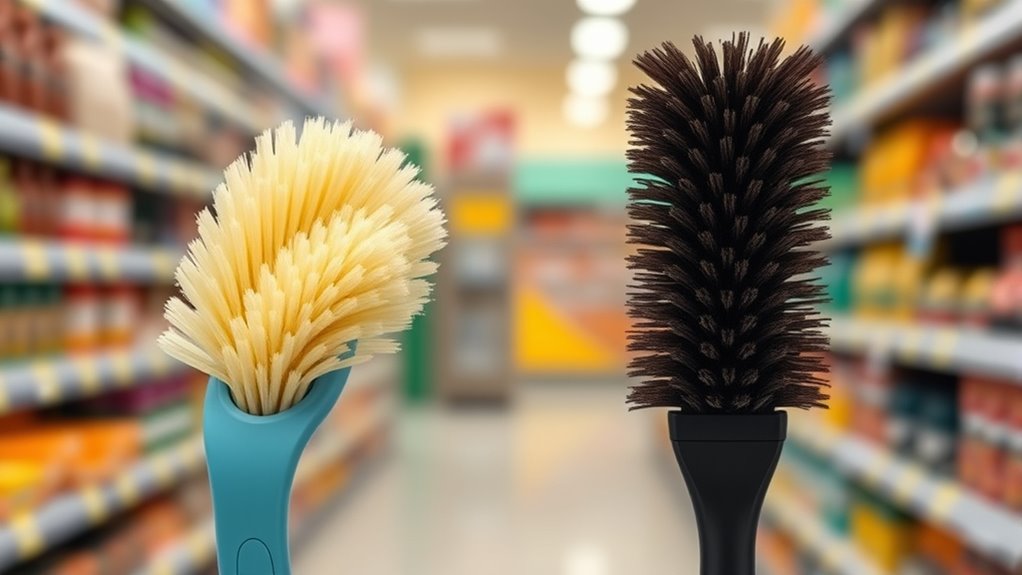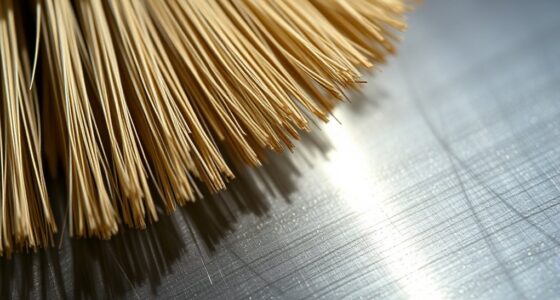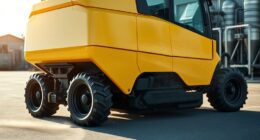When choosing between soft and stiff bristles, consider your cleaning task. Soft bristles are gentle, ideal for delicate surfaces and reaching tight spots, while stiff bristles provide more scrubbing power for stubborn dirt and outdoor grime. Your selection depends on whether you need gentle care or tough cleaning. If you want to find out which type suits specific surfaces and situations best, keep exploring below.
Key Takeaways
- Soft bristles are ideal for delicate surfaces and gentle cleaning, preventing scratches and damage.
- Stiff bristles excel at heavy-duty scrubbing and removing stubborn dirt or grime.
- Ergonomic handles enhance control and reduce fatigue, making cleaning more effective with both bristle types.
- Durability varies: soft bristles resist wear on sensitive surfaces, while stiff bristles withstand rigorous use.
- Choose soft or stiff bristles based on the cleaning task, surface delicacy, and cleaning intensity required.

When browsing the cleaning aisle, choosing between soft and stiff bristles can seem overwhelming, but understanding their differences helps you pick the right tool for the job. The key lies in contemplating how the brush’s ergonomic design and bristle durability influence performance. An ergonomic design means the handle is comfortable to grip and reduces hand fatigue during use. This comfort is essential, especially if you’ll be scrubbing for extended periods. Soft bristles often come with ergonomic handles that fit naturally in your hand, making tasks like cleaning delicate surfaces or reaching into tight spaces easier and less tiring. Recognizing the importance of proper technique can also enhance cleaning effectiveness and prevent fatigue. Bristle durability also plays a significant role in your decision. Soft bristles tend to be more gentle and less prone to damage from frequent use, which makes them ideal for cleaning sensitive surfaces like glass, electronics, or painted walls. They’re less likely to scratch surfaces, and their flexible nature allows you to maneuver around intricate areas without applying excessive pressure. On the other hand, stiff bristles are designed for heavy-duty cleaning. They’re built to withstand tougher scrubbing and resist wear over time, which is essential when tackling stubborn grime or outdoor dirt. Their durability ensures they maintain their shape and effectiveness even after repeated use, making them suitable for cleaning concrete, grout, or heavily soiled tools. Another aspect to consider is how the design of the brush influences cleaning efficiency. Soft bristles, with their gentle flexibility, excel at lifting dust and light debris without damaging surfaces. Their ergonomic handles also help you maintain control and apply just enough pressure without straining your hand. Stiff bristles, meanwhile, often feature a more robust ergonomic handle, allowing you to exert the force necessary to dislodge stubborn dirt. The combination of sturdy bristles and a comfortable handle means you can clean more aggressively without discomfort, making them indispensable for heavy cleaning tasks. Ultimately, the choice between soft and stiff bristles depends on your specific cleaning needs. If you’re working on delicate surfaces or need a gentle touch, go for soft bristles with ergonomic design and high bristle durability. For tougher jobs that require scrubbing power and long-lasting bristles, stiff brushes are your best bet. By understanding how ergonomic design enhances comfort and how bristle durability affects longevity, you’ll select the right brush for each task, ensuring efficient and effective cleaning every time.
Frequently Asked Questions
How Do Bristle Types Impact Cleaning Efficiency on Different Surfaces?
You’ll find that soft bristles work best on delicate surfaces, reducing abrasion potential and preventing damage. Stiff bristles, however, are more effective on tougher surfaces like tiles or concrete, where surface sensitivity isn’t a concern. Choosing the right bristle type guarantees you clean efficiently without harming surfaces. Pay attention to surface sensitivity and abrasion potential to select the perfect brush, making your cleaning more effective and safer.
Are There Health Risks Associated With Using Either Soft or Stiff Bristles?
Think of your toothbrush as a trusted shield—soft bristles tend to be gentle, reducing the risk of damaging gums and causing dental health issues, while stiff bristles can sometimes cause irritation or allergic reactions. Using the wrong type might lead to discomfort or even worsen oral health. Always choose a brush suited to your needs, and consult your dentist if you experience any allergic reactions or persistent discomfort.
Can Bristle Stiffness Affect the Lifespan of Cleaning Tools?
Yes, bristle stiffness can affect the lifespan of your cleaning tools. Stiffer bristles, made from durable materials, tend to last longer with frequent cleaning, especially on tough surfaces. Soft bristles may wear out faster if used often, as they bend or fray more easily. Your cleaning frequency plays a role—more frequent use of stiff-bristle brushes helps maintain their effectiveness, while soft-bristle tools might require more careful handling to extend their life.
Do Personal Preferences Influence the Choice Between Soft and Stiff Bristles?
Your personal preferences definitely influence your choice between soft and stiff bristles, as if your comfort and aesthetic tastes are the guiding stars. You tend to favor soft bristles when you prioritize gentle cleaning and a smooth feel, while stiff bristles appeal if you want tougher scrubbing power. Ultimately, your unique comfort and aesthetic preferences shape your decision, making the perfect brush an extension of your personal style and cleaning needs.
How Do Environmental Factors Influence Bristle Performance and Durability?
Environmental factors like temperature effects and eco-friendly materials impact bristle performance and durability. When exposed to high temperatures, stiff bristles may become brittle and break more easily, reducing their lifespan. Soft bristles made from eco-friendly materials tend to withstand moisture and temperature changes better, maintaining their effectiveness longer. You should consider these factors to choose brushes that last and perform well in your environment, ensuring sustainability and value.
Conclusion
Ultimately, choosing between soft and stiff bristles depends on your needs. Soft bristles offer gentle cleaning, gentle care, and gentle results, making them ideal for sensitive tasks. Stiff bristles provide firm scrubbing, tough cleaning, and tough stains removal, perfect for stubborn grime. Consider your surfaces, your goals, and your preferences. Whether you opt for softness or stiffness, remember that the right bristle makes all the difference—because the best tool is the one that works best for you.









